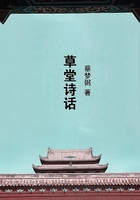A belongs to all B, and B to D, and again A belongs to no C. An error of this kind is similar to the error into which we fall concerning particulars: e.g. if A belongs to all B, and B to all C, A will belong to all C. If then a man knows that A belongs to everything to which B belongs, he knows that A belongs to C. But nothing prevents his being ignorant that C exists; e.g. let A stand for two right angles, B for triangle, C for a particular diagram of a triangle. A man might think that C did not exist, though he knew that every triangle contains two right angles; consequently he will know and not know the same thing at the same time. For the expression 'to know that every triangle has its angles equal to two right angles' is ambiguous, meaning to have the knowledge either of the universal or of the particulars. Thus then he knows that C contains two right angles with a knowledge of the universal, but not with a knowledge of the particulars; consequently his knowledge will not be contrary to his ignorance. The argument in the Meno that learning is recollection may be criticized in a similar way. For it never happens that a man starts with a foreknowledge of the particular, but along with the process of being led to see the general principle he receives a knowledge of the particulars, by an act (as it were) of recognition. For we know some things directly; e.g. that the angles are equal to two right angles, if we know that the figure is a triangle. Similarly in all other cases.
By a knowledge of the universal then we see the particulars, but we do not know them by the kind of knowledge which is proper to them; consequently it is possible that we may make mistakes about them, but not that we should have the knowledge and error that are contrary to one another: rather we have the knowledge of the universal but make a mistake in apprehending the particular. Similarly in the cases stated above. The error in respect of the middle term is not contrary to the knowledge obtained through the syllogism, nor is the thought in respect of one middle term contrary to that in respect of the other. Nothing prevents a man who knows both that A belongs to the whole of B, and that B again belongs to C, thinking that A does not belong to C, e.g. knowing that every mule is sterile and that this is a mule, and thinking that this animal is with foal: for he does not know that A belongs to C, unless he considers the two propositions together. So it is evident that if he knows the one and does not know the other, he will fall into error. And this is the relation of knowledge of the universal to knowledge of the particular. For we know no sensible thing, once it has passed beyond the range of our senses, even if we happen to have perceived it, except by means of the universal and the possession of the knowledge which is proper to the particular, but without the actual exercise of that knowledge. For to know is used in three senses: it may mean either to have knowledge of the universal or to have knowledge proper to the matter in hand or to exercise such knowledge: consequently three kinds of error also are possible. Nothing then prevents a man both knowing and being mistaken about the same thing, provided that his knowledge and his error are not contrary. And this happens also to the man whose knowledge is limited to each of the premisses and who has not previously considered the particular question. For when he thinks that the mule is with foal he has not the knowledge in the sense of its actual exercise, nor on the other hand has his thought caused an error contrary to his knowledge: for the error contrary to the knowledge of the universal would be a syllogism.
But he who thinks the essence of good is the essence of bad will think the same thing to be the essence of good and the essence of bad.
Let A stand for the essence of good and B for the essence of bad, and again C for the essence of good. Since then he thinks B and C identical, he will think that C is B, and similarly that B is A, consequently that C is A. For just as we saw that if B is true of all of which C is true, and A is true of all of which B is true, A is true of C, similarly with the word 'think'. Similarly also with the word 'is'; for we saw that if C is the same as B, and B as A, C is the same as A. Similarly therefore with 'opine'. Perhaps then this is necessary if a man will grant the first point. But presumably that is false, that any one could suppose the essence of good to be the essence of bad, save incidentally. For it is possible to think this in many different ways. But we must consider this matter better.















